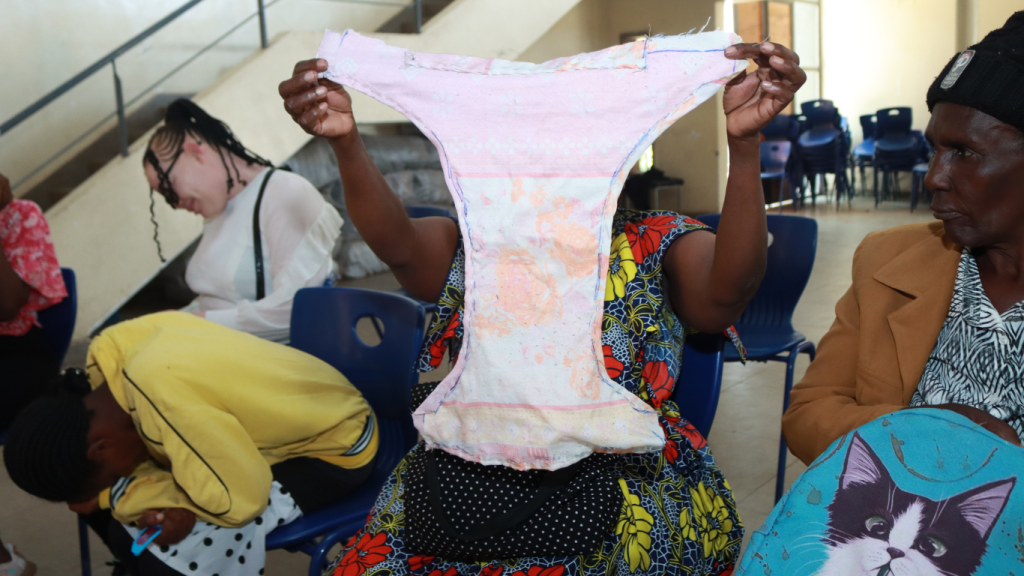The impact of the Make Way Programme to the communities
Summary
If I previously needed three diapers a day, I can now buy one and supplement with the two I make from the skills acquired here. This has significantly reduced my financial burden, allowing me to save money for food and other necessities. The same applies to sanitary towels, which can be life transforming for me as a mother,” Milka emphasized.
Our greatest satisfaction comes from witnessing the transformative impact of our initiatives, not only on our primary beneficiaries but also on their families and the wider community

During our monitoring visits to the Mukuru and Kibera Safe Spaces, we learned that to achieve lasting change, initiatives must be embraced and actively driven by the community members themselves. These safe spaces have become vital hubs of empowerment and education, fostering inclusivity and growth.
At the Mukuru Safe Space, we had the privilege of meeting Pauline Mwihaki, the mother of Mary Mwihaki, a young girl with a disability. Pauline shared her story, highlighting the profound benefits she has experienced through the safe space. Accompanying her daughter has not only enriched her understanding but also equipped her with valuable knowledge and skills.
The two caregivers have been allowed to the safe space by the members due to the severity of their girls’ disabilities, besides through their mothers presence and learning alongside them, they are able to learn more together at the family unit and also parents learning more on how best to take care of the girls with disabilities .

“In my younger days, discussions about Sexual and Reproductive Health and Rights (SRHR) were unheard of. Even when I got married, I had no idea that I had the right to make such decisions for myself. Through the safe space, I have learned so much, especially about the rights of girls with disabilities like my daughter Mary,” Pauline recounted.
Pauline expressed how the Make Way initiative has empowered her within her community. She now actively advocates for access to SRHR for young people. “I have learned the importance of knowing my HIV/AIDS status and that of my partner, understanding consent, and ensuring a safe and healthy intimate relationship. These teachings have not only transformed my perspective but have also enabled me to educate my daughters and neighbors. Many are surprised at how informed I have become, and it is fulfilling to see how these lessons positively impact their daily lives,” she shared.
Pauline’s story is not unique. Another caregiver, Milka Ndunge – mother to Jackline Namunyak – a young girl with mental disability, also shared her experiences. Milka described how her participation in the safe space has taught her to better cater to her daughter’s SRHR needs and access family planning services.
“This safe space has given me crucial skills, particularly on how to care for my daughter with disability. My child learns a lot from the illustrations and pictures shared here,” Milka explained. She also highlighted the practical benefits she has gained, such as learning how to make diapers and sanitary towels.
“If I previously needed three diapers a day, I can now buy one and supplement with the two I make from the skills acquired here. This has significantly reduced my financial burden, allowing me to save money for food and other necessities. The same applies to sanitary towels, which can be life transforming for me as a mother,” Milka emphasized.

Beyond the caregivers, the safe spaces serve as a sanctuary for young girls, enabling them to acquire advocacy skills, develop self-esteem, and nurture talents. Many girls testify to the immense transformation they have undergone socially and emotionally. Before joining the safe spaces, some struggled with self-expression and forming friendships. Now, they confidently engage with their peers and the community.
Make Way Programme’s theme is “Embracing intersectionality for health equity and justice” MakeWay.org. Where intersectionality, as coined by civil rights scholar Kimberlé Crenshaw, is an understanding that different sets of social identities like race, class, sexuality, etc. overlap to impact access to rights and opportunities. In this aspect, disability and other compounding vulnerabilities to access better SRHR services. Through the safe spaces, they can understand why the intersectionality concept should be applied in the health systems.
Through the valued partnership with http://www.afyaresearch.org/, the Mukuru and Kibera Safe spaces for adolescent girls and young women with disabilities has enhanced the communities in which these girls live.
“May such spaces continue to be established, as they are critical in teaching our young girls how to lead fulfilling lives. We have seen and experienced the benefits they bring to society we are urging them to continue with the good work as most people have not been reached and there is more to learn,” Pauline concluded.

#MakeWay #Intersectional SRHR Advocacy #inclusivecommunity.




